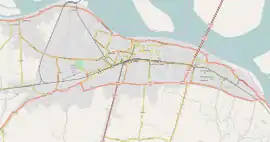Patna Collectorate
Patna Collectorate or (District Collectorate, Patna) is administrative head office of Collector of Patna district in Patna (district headquarters). It is situated on the bank of river Ganges, close to Gandhi Maidan. It is in the style of dutch architecture and British architecture[1] and is over 200-year-old building complex. In 2008, the Collectorate was listed as heritage building by the Government of Bihar.[2]
| Patna Collectorate | |
|---|---|
 Location within Patna | |
| General information | |
| Architectural style | Dutch & British |
| Location | Patna, Bihar |
| Country | India |
| Coordinates | 25°37′17″N 85°8′53″E |
| Elevation | 58 m (190 ft) |
| Owner | Government of Bihar |
History
The Dutch first came to Patna in the early 17th century. The building was constructed by the Dutch East India Company and it was used as a godown during the Dutch period.[3] During the British Raj, the British reused this building as Collectorate. The Collectorate started functioning from its present premises from 1857.[4] In 1938, the District Board building was added, which is built in the British architecture.[5]
Overview
The Collectorate is headed by the District collector (also called magistrates), an Indian Administrative Service (IAS) officer. Offices of The Additional District Magistrate & Deputy Collector (General), Deputy Collector (Land Acquisition),Deputy Collector (Revenue Recovery), Deputy Collector (Disaster Management), Deputy Collector (Election), Deputy Collector (Land Reforms) and office of the Senior Finance Officer are also functioning in Collectorate Building.
Recent controversy
In 2016, the Bihar government decided to dismantle the old buildings and replace them with a new complex. This led to widespread voiced protests and criticism by historians[5] and different organisations, most notably; the New Delhi based Indian National Trust for Art and Cultural Heritage[6] and the London based Gandhi Foundation.[7] In April 2016, Ambassador of the Netherlands to India Alphonsus Stoelinga in a letter to Bihar CM Nitish Kumar appealed to spare Collectorate demolition.[2]
See also
External links
- Successor list of Patna District Magistrate & Collector Patna.bih.nic.in
References
- "Bihar FM supports saving Dutch-era Collectorate, linking culture, heritage with tourism". The Indian Express. 19 June 2016. Retrieved 17 September 2016.
- "Dutch govt appeals to Nitish Kumar to spare Collectorate demolition". Deccanchronicle.com. Retrieved 17 September 2016.
- Kalikinkar Datta. The Dutch in Bengal and Bihar 1740-1825 A.D. University of Patna, 1948.
- Vivek Kumar Singh, Sudhir Kumar Jha, Bihar (India). Youth, Art, and Culture Department (2008). Patna: A Monumental History. Department of Art, Culture and Youth, Government of Bihar.CS1 maint: multiple names: authors list (link)
- "Patna Collectorate unique, as important as Golghar: Historians". The Hindu. 17 May 2016. Retrieved 17 September 2016.
- By PTI (14 February 2016). "Patna's historic Collectorate faces demolition; INTACH opposes - The Economic Times". Economictimes.indiatimes.com. Retrieved 17 September 2016.
- "London-based Gandhi Foundation appeals Nitish Kumar to preserve Patna Collectorate". The Indian Express. 10 July 2016. Retrieved 17 September 2016.